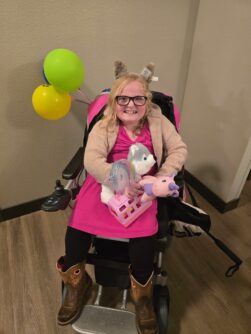
Managing Medical Trauma
By Barbara and Jim Twardowski, RN | Friday, December 13, 2024
Crystal Killian, who lives with mitochondrial myopathy, recalls being home alone and feeling extremely ill, so she phoned her mother-in-law to have her check on her later. As she was on the phone, her body curled into a fetal position, her face contracted, and her head ached. When Crystal began slurring her words, her mother-in-law called 911.
Emergency personnel arrived at Crystal’s home only to find the door locked. They stood at her doorway but did not enter her home. Crystal gently rocked her body just enough to fall off her sofa, slowly scooted her way to the door, and used her head to push the handle up. Luckily, the door could be opened from inside and did not require a key to unlock it.
Although this incident occurred 16 years ago, Crystal refuses to have a door locked whenever she is alone or even has an aide with her. She even refuses to have the door closed when waiting at the doctor’s office if she’s in the room by herself. She believes this is just one of the many ways she’s been traumatized by a medical incident.
What is medical trauma?

Crystal Killian
Researchers began describing traumatic stress reactions from pediatric medical events in the mid-1980s. As the decades passed, there has been more awareness and study surrounding the distress that can result from a negative experience in a medical setting.
Both children and adults can be affected by medical trauma. It is highly subjective; everyone responds differently. The fear of reliving a stressful event might lead to avoiding treatment, being anxious, and mistrusting medical professionals.
“Medical trauma is an emotional and physical response to pain, injury, serious illness, medical procedures, and frightening treatment experiences,” according to the International Society for Traumatic Stress Studies, an organization that comprises clinicians and researchers.
Living with a neuromuscular disease and medical trauma
Situations that might trigger medical trauma include receiving a troubling diagnosis, undergoing invasive procedures, and misdiagnosis.
“When you have a neuromuscular disease, you may have repeated issues on multiple fronts,” says Melissa Grove, MS, LLPC, a retired therapist and licensed professional counselor who lives with limb-girdle muscular dystrophy (LGMD). “Managing a chronic illness may mean being your own medical case manager.” Coordinating multiple doctor appointments, frequent hospital stays and coping with complex health concerns are stressful and anxiety-producing.
Typically, medical care concentrates solely on a patient’s physical condition, while their mental needs are often ignored, never discussed, or misunderstood.
Reactions to medical trauma
The reactions associated with medical trauma can affect day-to-day functioning, impede adherence to medical treatment, and affect recovery when persistent.
According to The National Child Traumatic Stress Network, some reactions to medical trauma include:
Avoidance
- Avoiding talking or thinking about one’s illness, hospitalization, or experiences associated with it
- Being disinterested in one’s usual activities
- Feeling detached from others or emotionally numb
Re-experiencing
- Frequent, unwanted, and intrusive thoughts about the trauma-causing event
- Feeling distressed when reminded of it
- Having flashbacks and nightmares
Hyperarousal
- Difficulty concentrating or sleeping
- Exaggerated startled response — always expecting danger
- Increased irritability
Other reactions
- Feeling spacey
- New physical ailments such as stomach issues or headaches
Feeling traumatized at diagnosis

Tina Vassar
Receiving a diagnosis can be a trigger. Many individuals wait for years to be accurately diagnosed. And while there is relief at having a name for the illness, grieving over the loss of one’s health and functionality is a common response.
“Parts of this country are not covered well by medical specialists,” says Tina Vassar, a retired RN who lives with myasthenia gravis (MG). “And patients who do not have access to a neurologist who specializes in neuromuscular disease can, in some cases, receive their diagnosis from a primary care physician who may not be very familiar with their condition.”
When Tina received her diagnosis some thirty years ago, there was very little information about her rare disease. “I was basically told to get my affairs in order, and that I probably wouldn’t survive five years,” she says. The delivery of a diagnosis does not need to be so grim; it’s important the message is presented to patients with a sense of hope.
Children and medical trauma
Up to 80% of kids who are ill or injured, as well as their families, have experienced some traumatic stress reactions after an injury, life-threatening illness, or a painful medical procedure, according to the National Child Traumatic Stress Network.
Mesa OeDell has Duchenne muscular dystrophy (DMD) and asthma. She has undergone a variety of hospital visits — some planned and some not. After a wonderful weekend celebrating her tenth birthday, Mesa had a seizure at school. She spent the evening in a hospital emergency department undergoing tests. Dealing with a chronic medical condition can be scary for a young child and stressful for their parents.
During medical testing, Mesa expresses her fear by throwing tantrums and screaming — behaviors that have made it difficult for the medical team to complete their tasks.
“Mesa’s DMD has caused a cognitive and intellectual delay,” says Kimberly OeDell, Mesa’s mom. “She understands what you say but her ability to verbalize her exact thoughts is delayed. This can be frustrating to her if people do not give her time to respond. Also, since she can’t verbalize things quickly enough, in a stressful environment, her frustration comes out as tantrums because she is so overwhelmed.”

Mesa OeDell
To combat her child’s anxieties, Kimberly tries to prepare her for difficult medical procedures by explaining to her what will happen in great detail. She has found Mesa does not like surprises. For example, knowing in advance that the gel placed on her body for an echocardiogram will be cold and then get warmer helps Mesa tolerate the procedure.
Keeping a child informed about the steps in a procedure gives them more control over a medical encounter and can help alleviate stress, according to the National Child Traumatic Stress Network.
Parents who are upset or just need to talk with someone when their child is hospitalized can ask the staff for guidance or assistance. Speaking with the care team, a social worker, chaplain, and/or mental health professional can be beneficial to a parent.
The National Child Traumatic Stress Network website also provides a variety of handouts for families and healthcare professionals. These resources are filled with easy-to-understand suggestions on helping parents, children, and family members manage potentially traumatic medical scenarios.
Coping with medical trauma
You can combat medical trauma with an arsenal of tools:
- Melissa is a huge proponent of joining a Facebook group made up of people who have the same disease you do. For 15 years, she’s participated in one and finds tremendous comfort in being able to vent, as well as provide empathy for others. “Even if we don’t have an answer to a complicated problem, we can always say, ‘I don’t really know how I would deal with that, but I’m thinking about you and I’m sorry you’re going through this.’ This simple exchange is powerful and helpful,” she says.
- Tina encourages everyone to join a support group. She’s led several in-person groups and says to share this resource with your physician. “Make your doctor appointment a two-way conversation — you are helping them,” she says.
- Avoid “talking to Dr. Google.” Misinformation is rampant. Become knowledgeable about your neuromuscular disease using reputable resources. Knowledge is empowering. “You have to be your own advocate,” Tina says. Prepare for situations that can occur when you are in a medical crisis and may not be able to speak. Carry the paperwork with you that explains your condition and treatment protocols. Be sure to include your doctor’s name and their phone number.
- Be prepared for emergencies, especially when traveling. If you are taken to a hospital that doesn’t understand your illness, then you or someone traveling with you needs to be able to provide the information.
- Crystal finds journaling and writing poetry about her medical trauma helps her interpret these experiences.
- Find an avenue to express your story. “Share your grief, anxieties, and fears,” Melissa adds. Routinely talking to a therapist can help you manage the stress associated with having a neuromuscular disease.
Remember that having a strong emotional reaction to medical emergencies or procedures may be unexpected but it’s perfectly normal. (These feelings might even sneak up on you well after the fact.) Help is available, however. Check for support groups in your community and online, with your MDA Care Center or through the MDA Resource Center.
Next Steps and Useful Resources
- Stay up to date on Quest content! Subscribe to Quest Magazine and Newsletter.
Disclaimer: No content on this site should ever be used as a substitute for direct medical advice from your doctor or other qualified clinician.




